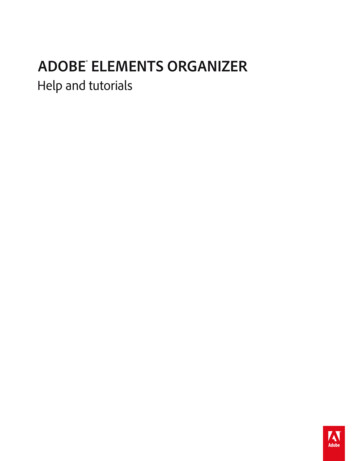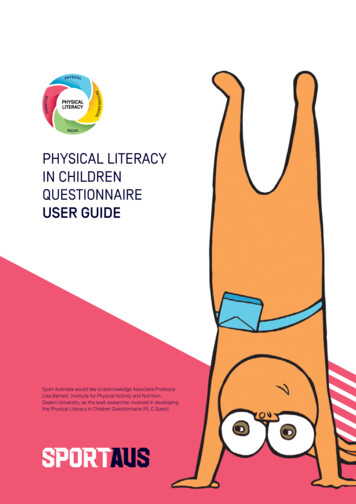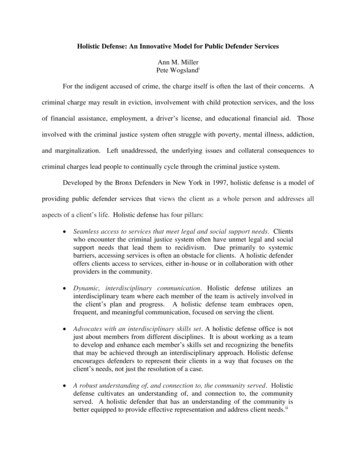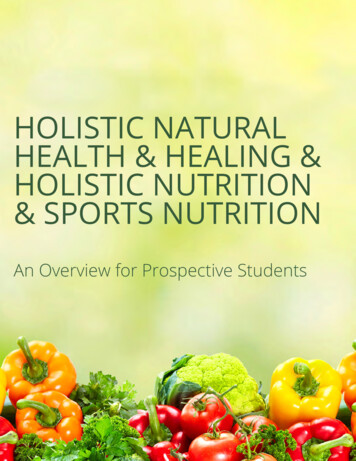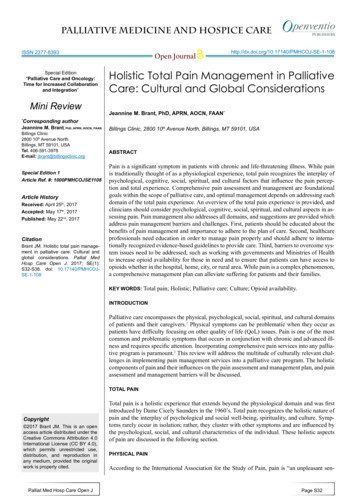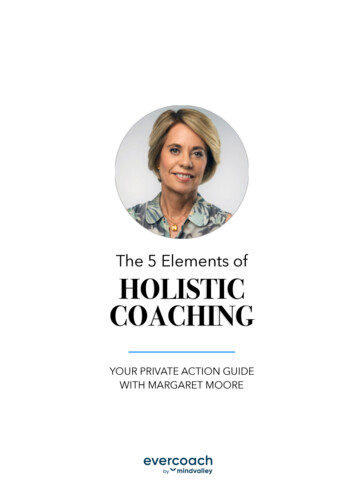
Transcription
The 5 Elements ofHOLISTICCOACHINGYOUR PRIVATE ACTION GUIDEWITH MARGARET MOORE
WELCOME TO YOUR PRIVATE ACTION GUIDE5 Tips to Get the Most Out of This Masterclass1. Print this guide before the Masterclass so you can take notes as you listen.You can also download and type directly in the guide to save paper.2. Review the contents of this guide before the Masterclass so you know whatto expect, and you can best set aside private time before, during, and after theMasterclass to complete the activities.3. You can pause the Masterclass video to take notes or fill in the blanks byclicking on the video screen.4. Think of how you can quickly implement the lessons revealed in this sessionto improve your coaching and impact.5. During the Masterclass, use the dedicated space on the right side towrite down ALL interesting new ideas and inspirations you get whilelistening - that way you won’t lose the most relevant information to you.“Engage biology’s triple aim. Connect. Grow. Thrive.”- Margaret Moore
PART 1: PRE-MASTERCLASS EXERCISEStart with IntentionWrite down and set your positive intentions here. What are your intentions forjoining this Masterclass? What do you hope to leave with?“As Coaches we are now more needed than ever.”- Margaret Moore
WHAT TO EXPECTTable of ContentsPART 1: PRE-MASTERCLASS EXERCISE Set your intentions before the MasterclassPART 2: THE 5 ELEMENTS OF HOLISTIC COACHING Element 1: Understanding Coaching Psychology Element 2: Organising Your Mind Element 3: Emotional Intelligence Element 4: Body Intelligence Element 5: Transformational ChangePART 3: TEST YOUR KNOWLEDGE Solidify your learning after the Masterclass by completing a quizPART 4: EXERCISE Craft your unique personal message after the MasterclassPART 5: REFLECTION Integrate by asking yourself some powerful questionsPART 6: REVIEWS & STUDENT STORIES Read what other people say about Margaret Moore
PART 2THE 5 ELEMENTS OF HOLISTICCOACHINGFollow along the Masterclass and fill in the blanks. You can pausethe video to write down your answers or take notes on the right.Click on the video to pause. But pay attention, because you cannotrewind!Emotions are your talking to you.Growth Edges are moments in which you feel either the need to be in control(pushy) or depleted. This is a sign that your emotions are trying totell you something that can help you grow.Our clients are not necessarily ready to work on all their edges.Growth edges are uncomfortable so you can see if somebody is ready andmotivated to move past them or not.ELEMENT 1 : Understanding Coaching PsychologyThe most respected theory of human motivation in the past has beenMaslow’s Hierarchy of .As Maslow’s theory did not have enough science to back it up, researcherscame up with a few theories on intrinsic motivation.These propose the notion that there are different forces within a human thatlead to different types of motivation and not all of them lead to long lastingtransformation. There are 4 theories that stand out. Here are two of them:1. Self-Determination Theory (by Deci & Ryan) states that of all our needs there are 3 that stand above the rest:1.2. Desire for Relationships that support Autonomy3. Need to be Competent
2. Transtheoretical Model for Behaviour Change (by Prochaska)This model helps understand the forces that determine whether or not youyou are .There are 5 stages of readiness. There’s a lot of subtle forces thatdetermine whether you really are ready or not. What underpins the 5stages is something very simple: decisional balance.Decisional balance is the balance between the reason toand the reason not to change.When you’re for example in pre-contemplation your reasons not to changeare really weighing down, and you either or .Most of us sit in the balance of change and no change. That’s thesweet spot for .The other stages include action and maintenance. The best spot for youto help as a coach is when somebody wants change & believes they cando it.ELEMENT 2 : Organising Your MindAs coaches we should be ahead in organising our minds.There are 6 areas to focus to better organise our minds.One of these areas is a mind.You can go for a run, do mindfulness techniques, get a good night sleep.Important is that as coaches we show up present and that works best withour minds .The second is being in a deep .There are many kinds of it. It can be just thinking. It can be free flow. Anotheris being judgemental.By using these different principles to organise your mind, you can make sureto guide your conversation with agility. Dive deep and go back out.There’s a phenomenon in Neuroscience that’s called syncing. The reason whythis works is because your client is tuning into your state of .
ELEMENT 3: Emotional IntelligenceYour emotions are speaking to you expressing a you have.Mindfulness helps you embrace these emotions without pushing them away.Emotional Intelligence is really about paying attention to your emotions.Positive emotions are saying: .Negative emotions ask you to take a deeper look.The first step to Emotional Intelligence is to your emotions insteadof wishing them to go away.The second step is to the message they’re trying to tell you.Once we’ve learned the lesson it’s often about switching the channel andmoving on. If you’re looking for places to coach, just follow .You also need enough emotions to be able to navigate thenegative ones.ELEMENT 4: IntelligenceThis is a new concept that Margaret developed with the psychologist JimGavin. Body Intelligence is a relatively new area.We don’t spend a lot of time living in our body. The framework we talk aboutstarts with to your body. This involves breath, heartbeat, etc.Body Intelligence is about being aware of your body’s needs and actuallyin that right activity.It takes some time to really listen and focus. It’s a lifelong journey,because as you age it .
ELEMENT 5: Transformational ChangeCoaches are the experts in helping people change. Transformational Change isreally a shift in our .The identity we currently have is not going to help us master the challengesthat we’ll be dealing with in the future.Transformational Change is a change in and in behaviour. Thatmeans we act differently, we feel differently, we think differently.There’s 3 levels of transformational change.1: You learn something new.2: You have a shift in perspective.3: You have a shift in identity.The brain can only create 1mm of neural network a day. That’s why the brainneeds a lot of small steps to reach a bigger shift.The question therefore becomes: How do we help people make those changesfaster and better?PART 2 OF YOUR GUIDE IS NOW OVER.YOU MAY PUT THIS GUIDE ASIDE UNTIL THE END OF THE MASTERCLASS.ENJOY THE REST OF YOUR CLASS!
PART 3: TEST YOUR KNOWLEDGEComplete this quiz after the Masterclass to solidify your learning.1. What are the 5 Elements of Holistic Coaching put forth by Margaret Moore?2. Why is it important for coaches to organise their minds?3. What’s the most simple way to explain emotional intelligence and how can emotions helpus create transformations?4. Self-Determination Theory states that 5. What’s the difference between normal change and transformational change?
PART 4: EXERCISETry this exercise using the lessons Margaret revealed in the Masterclass to craftyour methodology. Use an extra piece of paper if you need to.1. How are you going to use what you’ve just learned from the 1st Element (UnderstandingCoaching Psychology) to be a better coach?2. What’s your way of organising your mind and helping your clients organise their minds?What is one way that you can get more skilled in this?3. How can you integrate what you’ve just learned on Emotional Intelligence into your life oryour current coaching methodology?4. What is something about Body Intelligence that you want to share with your friends, family& clients?5. What’s a growth edge and how are you currently helping your clients and how can youhelp help your clients move faster past these growth edges in the future?
PART 5: REFLECTIONThe right questions can spur your unconscious mind to feed you the rightanswers. So ask yourself (Use an extra piece of paper if you need to).1. What would your life look like if you were to understand and integrate the fullscience behind coaching and the ways how to holistically coach your clients?2. How can you contribute more to your family, relationships, yourself, and yourcommunity if you enhance your expertise as a coach?3. How will your life change once you’re able to step up and lean into the person you’remeant to be?4. What is the one thing you can do right now to demonstrate you are dedicated toelevating your expertise and ability as a coach?THANK YOU for joining Margaret Moore’s Masterclass!To take your methodology and impact to the next levelplease visit http://bit.ly/holistic-coaching for info onMargaret’s remarkable program on Holistic Coaching.But do not sign up for the course anywhere else since at the end of the webinar the price will bereduced as a thank you for webinar participants!
PART 6: REVIEWS & STUDENT STORIES“The world needs more visionaries like yourself”"Thank you, Coach Meg! You refer to coaching as "a very sophisticated formof facilitation. of someone else's learning, growth, creativity.". And, youindicated that "when you become a coach, you sign up for lifelong changeand growth on a steep trajectory.". It resonated very much with me. Theworld needs more visionaries like yourself with courage, confidence, curiosity,and connections to develop and implement transformational programs.Thank you for leading the way!- Nahide“After 44 years in nursing, your program reset my clock”In my diabetes group session last night, Alex, a newly diagnosed patient,shared with me. "I can't thank you enough for being so positive and optimisticabout this disease.my other health care providers have been all so doomand gloom." After 44 years in nursing, your program reset my clock. I start withthe positive and carry that through with all my patients. I just wanted you toknow the impact you're making! Susan
“Here is a woman who is super smart, energizing,relatable and unbelievably articulate”So often you don’t get to hear the impact you made. I have been a longtimefan of your work. I’m sure you don’t remember, but I attended a breakoutsession you led at the Art & Science of Health Promotion conference wayback in 2008 (and introduced myself to you afterwards). It was truly one ofthe most memorable talks I’ve ever attended, and contributed toward mymoving into this field! I thought to myself: here is a woman who is supersmart, energizing, relatable and unbelievably articulate. Your talk is whatsold me and got me hooked. So, thank you for that! Laura“I have learned & continue to learn a tremendousamount”I want to share my sincerest appreciation & gratitude to you for researching,publishing, & advocating for health & wellness coaching. Your passion forcoaching is highly reflected in all of your work. As a practicing coach, whostarted coaching because of your insightful material, I have learned &continue to learn a tremendous amount from your publications. I am soextremely excited to see the Wellcoaches behavior change coaching modelbeing practiced & adopted by so many health & wellness related fields.Thank you again, Coach Meg! Lauren
WHAT TO EXPECT Table of Contents PART 1: PRE-MASTERCLASS EXERCISE Set your intentions before the Masterclass PART 2: THE 5 ELEMENTS OF HOLISTIC COACHING Element 1: Understanding Coaching Psychology Element 2: Organising Your Mind Element 3: Emotional Intelligence Element 4: Body Intelligence Element 5: Transformational Change



